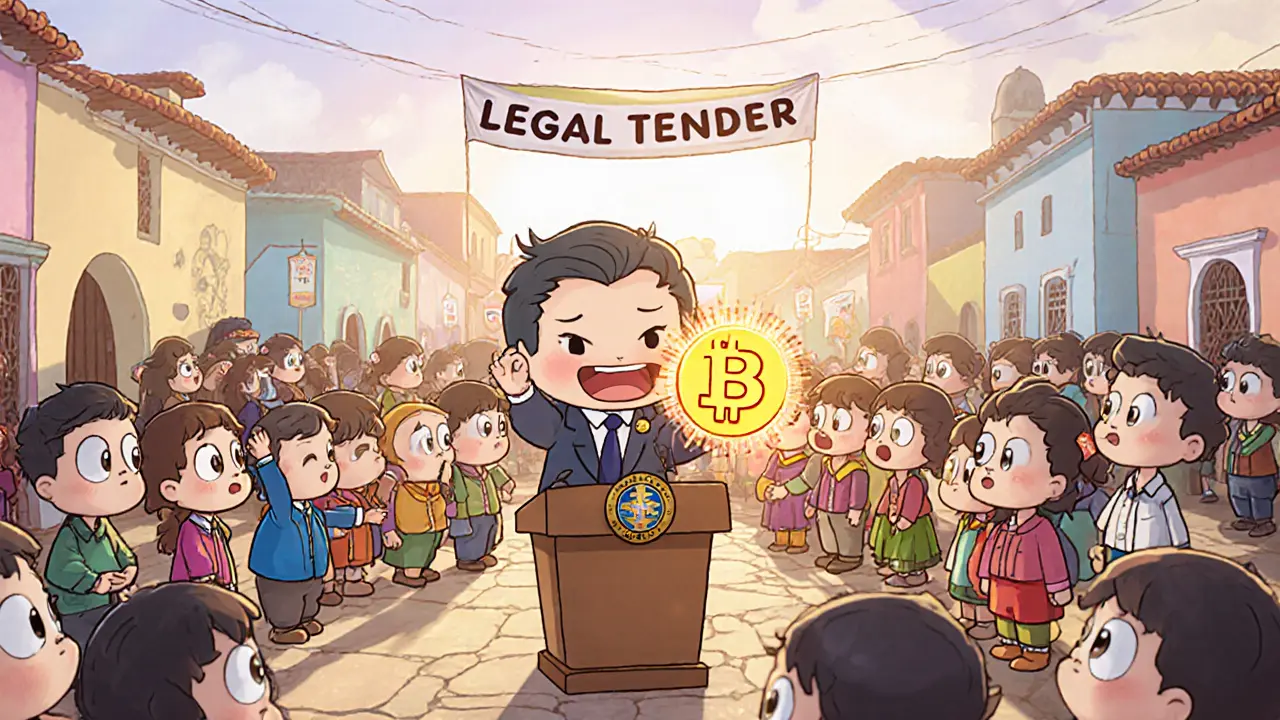El Salvador Bitcoin Legal Tender Impact Calculator
Impact Analysis Result
Enter values and click Analyze to see the impact assessment.
Comparison Table: Bitcoin Legal Tender vs. CBDC
| Factor | Bitcoin Legal Tender | Central Bank Digital Currency (CBDC) |
|---|---|---|
| Monetary Sovereignty | Undermined - Fixed supply, no policy control | Maintained - Direct control over supply |
| Price Stability | High volatility - Risk for consumers | Stable - Pegged to national currency |
| Regulatory Compliance | Challenging - Pseudonymous nature | Easier - Built-in AML/KYC features |
| Public Adoption | Low (< 5%) - Limited real-world usage | Higher - Backed by state trust |
Key Takeaways
- ElSalvador made Bitcoin legal tender in 2021, forcing all businesses to accept it alongside the US dollar.
- The International Monetary Fund, World Bank and most central banks have publicly warned that the move raises fiscal, legal and financial‑stability risks.
- Legal scholars argue that compulsory Bitcoin acceptance violates freedom‑of‑exchange principles common in modern contract law.
- The crypto community praises the law as a milestone, but on‑ground data shows less than 5% of sales actually use Bitcoin.
- Comparisons with central‑bank digital currencies (CBDCs) highlight why many countries prefer a sovereign digital token over a decentralized one.
Background: What the Law Actually Says
On June92021 ElSalvador’s Legislative Assembly passed the Bitcoin Law a statute that declares Bitcoin a legal tender alongside the US dollar. Article7 is the boldest clause: any economic agent must accept Bitcoin when offered as payment. The law also permits tax payments, debt settlement and international remittances in Bitcoin, and it created the state‑run Chivo Wallet a mobile app that offers a $30‑equivalent Bitcoin bonus to jump‑start adoption.
To avoid runaway inflation, the decree caps Bitcoin’s supply at 21million - the same limit embedded in the protocol itself - and requires every transaction to be automatically converted to US dollars for accounting purposes. In practice, the government’s accounting still treats the dollar as the reference currency, meaning the Bitcoin side of the ledger is more a payment‑routing layer than a true sovereign balance sheet.
International Monetary Institutions Speak Out
Almost immediately after the law’s implementation, the International Monetary Fund (IMF) the global fund that monitors macro‑economic stability and provides policy advice to member states issued a scathing assessment. In its 2022 ArticleIV consultation, the IMF warned that “the adoption of a volatile, non‑sovereign asset as legal tender exposes the country to significant exchange‑rate risk and could undermine fiscal discipline.” The IMF also flagged potential violations of anti‑money‑laundering (AML) standards, noting that the law’s forced‑tender clause hampers transaction monitoring.
Similarly, the World Bank an international financial institution that funds development projects and provides policy advice issued a brief note stating that “while innovation is welcome, the lack of a clear legal framework for cryptocurrency transactions could deter foreign investment and complicate debt‑service calculations.”
Both institutions urged ElSalvador to retain the US dollar as the sole legal tender until a robust regulatory apparatus for digital assets is in place.
National Governments and Central Banks React
Across the Atlantic, the United States Treasury’s Office of International Affairs released a statement that “the United States does not support the use of cryptocurrencies as legal tender without clear consumer protections.” The European Central Bank (ECB) echoed a similar sentiment, emphasizing that “stable, sovereign‑backed digital currencies are preferable for preserving monetary policy autonomy.”
Some emerging‑market central banks took a more neutral tone. The Central Bank of the Bahamas, which already launched the Sand Dollar CBDC, suggested that ElSalvador’s experiment could offer “useful lessons on digital‑currency infrastructure, even if the underlying asset is decentralized.”
Overall, the dominant narrative among nation‑states is caution: they see Bitcoin’s price swings as a threat to monetary stability and prefer a digitally issued token that remains under central‑bank control.
Legal Scholars Question Forced Tender
Dror Goldberg, a professor of comparative law, published an article titled “Compulsory Tender in the Age of Cryptocurrencies.” He argues that mandatory Bitcoin acceptance breaches the “freedom of exchange” doctrine that underpins modern contract law. Goldberg notes that most jurisdictions, including the United States, allow merchants to refuse cash for credit‑only sales - a flexibility deliberately omitted in ElSalvador’s law.
Other scholars point out that forcing producers to accept a volatile asset risks “property‑rights erosion.” If a farmer must receive Bitcoin for a crop and the market price crashes overnight, the farmer suffers a loss that the state cannot readily compensate, unlike a fiat devaluation where central banks may intervene.
These legal critiques have fueled diplomatic friction, as several foreign ministries have warned that contracts executed under forced‑Bitcoin terms could be contested in international arbitration.

Crypto Community and Industry Viewpoints
On the other side of the divide, the crypto community hailed the law as a historic validation of Bitcoin’s “store‑of‑value” narrative. Influencers on Twitter and YouTube called ElSalvador the “first true Bitcoin nation,” and venture‑capital firms announced exploratory funds to support blockchain startups in the country.
However, even among enthusiasts, a pragmatic chorus warned that the law’s success hinges on real‑world usage, not just symbolic adoption. Deloitte’s blockchain practice shared a brief note stating, “Adoption incentives must translate into daily transaction volume, otherwise the law remains a PR stunt.”
On‑Ground Adoption Data
Empirical studies paint a sober picture. Alvarez, Argente and Van Patten (NBER Working Paper 29968) found that while 50% of households downloaded the Chivo Wallet in the first month, 60% of those users never made a second transaction after spending their free Bitcoin bonus. By late‑2022, only roughly 5% of all retail sales were settled in Bitcoin, and 88% of merchants immediately converted the received Bitcoin into US dollars.
The data also reveal a demographic skew: adoption is highest among young, male, banked users - the very segment the law aimed to exclude (the unbanked 70% of the population). Average ATM withdrawals for active users sit at 2.59 per month, suggesting that a small core of power users drives most wallet activity.
Bitcoin Legal Tender vs. Central‑Bank Digital Currencies
To understand why many countries prefer CBDCs, consider three core dimensions:
- Monetary sovereignty: CBDCs remain under a central bank’s balance sheet, allowing direct control over money supply and interest rates. Bitcoin’s protocol‑level supply is fixed, removing any policy tool from the government.
- Stability: A CBDC can be pegged to the national currency and enjoy the backing of the state’s fiscal capacity. Bitcoin’s price can swing 10%+in a single day, creating exchange‑rate risk for everyday purchases.
- Regulatory oversight: CBDCs can embed AML/KYC checks at the protocol layer. Bitcoin’s pseudonymous nature makes compliance more cumbersome, which is why the IMF flagged “potential AML gaps.”
The table below summarizes the stances of major institutions on Bitcoin legal tender versus CBDCs.
| Institution | Bitcoin Legal Tender | CBDC Preference |
|---|---|---|
| International Monetary Fund | Critical - cites volatility & AML risks | Supportive - sees CBDC as stability tool |
| World Bank | Cautious - needs robust legal framework | Neutral - monitors pilot projects |
| U.S. Treasury | Opposed - lacks consumer protections | Open - exploring digital‑dollar concepts |
| European Central Bank | Unfavorable - threatens monetary policy | Positive - advancing digital euro |
| Bahamas Central Bank | Neutral - observes for infrastructure lessons | Supportive - already runs Sand Dollar |
Implications for Future Policy
ElSalvador’s experience offers a cautionary template for any country contemplating a sovereign cryptocurrency:
- Incentive design matters. The $30 Bitcoin bonus generated downloads but not sustained usage. Policy makers should pair incentives with merchant‑side value propositions (e.g., lower remittance fees).
- Legal certainty is paramount. Forced‑tender provisions clash with international contract law and can invite arbitration disputes.
- Infrastructure must be robust. The rapid conversion of Bitcoin to dollars by 88% of merchants shows a lack of confidence in Bitcoin’s stability and highlights the need for reliable price oracles.
- Targeted financial inclusion. The unbanked remain largely untouched. Hybrid models that combine CBDCs for basic payments with optional crypto layers may achieve broader reach.
Some developing nations-like Nigeria and Ukraine-are watching ElSalvador closely while simultaneously piloting their own CBDCs. The prevailing sentiment in policy circles is that a government‑issued digital token provides the innovation boost without surrendering monetary sovereignty.
Next Steps for Stakeholders
Policymakers: Draft clear AML/KYC rules, consider voluntary rather than compulsory crypto acceptance, and evaluate hybrid models that let citizens choose between fiat and digital tokens.
Investors and Crypto Firms: Treat ElSalvador as a testbed-focus on infrastructure services (wallet APIs, point‑of‑sale integrations) rather than betting on legal‑tender status alone.
Academics: Continue longitudinal studies on transaction volumes, price‑conversion patterns, and social‑impact metrics to feed evidence‑based policy.
Frequently Asked Questions
Why did ElSalvador choose Bitcoin over a CBDC?
The government argued that Bitcoin’s decentralized nature would bypass traditional banking fees and attract foreign investment, especially from the crypto‑savvy diaspora that sends over 20% of the country’s GDP in remittances.
What does the IMF’s criticism mean for ElSalvador’s credit rating?
While the IMF’s statements have not triggered an immediate downgrade, they have raised the cost of borrowing. Lenders now demand higher risk premiums because the country’s monetary base includes a highly volatile asset.
Do merchants really have to accept Bitcoin?
Legally, yes-Article7 obliges all economic agents to accept Bitcoin when offered. In practice, enforcement is weak, and many small businesses avoid Bitcoin by converting it instantly to dollars or by refusing it outright.
How does Bitcoin adoption in ElSalvador compare to CBDC pilots elsewhere?
CBDC pilots in the Bahamas, Nigeria and Sweden report higher transaction frequency because the digital token is backed by the central bank and integrated with existing payment rails. ElSalvador’s Bitcoin usage peaks at under 5% of retail sales, far below the 30‑40% observed in successful CBDC rollouts.
Is the El Salvador Bitcoin legal tender experiment likely to be replicated?
A few nations have expressed interest, but most are opting for CBDCs or hybrid approaches. The mixed results-high hype, low everyday use, and strong international criticism-make a straight copy‑cat unlikely.




Anne Zaya
July 10, 2025 AT 12:05Wow, that whole Bitcoin‑as‑legal‑tender saga in El Salvador is a wild ride. It’s cool to see a small country try something that flips the script on traditional finance, and the data you shared about adoption rates really paints the picture. I think the biggest takeaway is how the hype didn’t translate into everyday checkout lanes – less than 5% of sales using Bitcoin is a striking number. It shows the difference between a tech‑savvy narrative and real‑world economics. Anyway, love the deep dive – makes me want to keep an eye on how other nations shape their digital currency policies.
Emma Szabo
July 15, 2025 AT 03:13Reading through those tables felt like flipping through a kaleidoscope of colors – the contrast between Bitcoin’s untamed volatility and the calm stability of a CBDC is practically a rainbow of financial pathways! 🎨 The way you highlighted the IMF’s concerns paired with the hopeful crypto community vibe is spot‑on. It’s like watching a thriller where the hero (Bitcoin) has a flashy cape but the sidekick (CBDC) brings the real tools to the rescue. Keep the data rolling, because every stat is a brushstroke on this massive canvas of monetary innovation.
Fiona Lam
July 19, 2025 AT 18:36Honestly, the whole thing reads like a reckless stunt. Forcing businesses to take a wildly unstable asset is a recipe for disaster – you can bet the IMF isn't the only one shaking its head. The data shows merchants are already converting Bitcoin to dollars faster than you can say “price shock”. If a country wants to be taken seriously, it needs to stop playing with fire and start offering something grounded.
OLAOLUWAPO SANDA
July 24, 2025 AT 10:00People keep whining about Bitcoin’s risk while ignoring the freedom it gives. El Salvador showed the world that a nation can say “enough” to the old banking chains and try something new. If the numbers look low now, that’s just the teething phase – you can’t expect a revolution to happen overnight.
Alex Yepes
July 29, 2025 AT 01:23From a policy‑analysis standpoint, the El Salvador experiment is a fascinating case study in sovereign monetary experimentation. The juxtaposition of a fixed‑supply cryptocurrency against a fiat‑backed system raises profound questions about fiscal discipline, monetary sovereignty, and the role of regulatory oversight. While the initial adoption metrics appear modest, the broader implications for international financial stability merit close observation. Moreover, the strategic intent to attract diaspora remittances via a decentralized network underscores a nuanced approach to macro‑economic development. In sum, the endeavor offers valuable lessons for any jurisdiction contemplating digital‑currency integration.
Sumedha Nag
August 2, 2025 AT 16:46Okay, I get the hype, but the reality on the ground is pretty grim. Most people just downloaded the Chivo app for the $30 bonus and never used it again. If the government wants real financial inclusion, it needs to address the underlying infrastructure and trust issues, not just throw a shiny token at the problem.
raghavan veera
August 7, 2025 AT 08:10When we examine the philosophical underpinnings of El Salvador’s Bitcoin decree, we confront a tension between libertarian ideals and pragmatic governance. The notion of compulsory acceptance appears to invert the very principle of voluntary exchange that undergirds modern contract theory. Moreover, the fixed supply of Bitcoin, while mathematically elegant, eliminates a crucial tool of monetary policy: the ability to adjust the money base in response to shocks. This rigidity can exacerbate economic volatility, especially for a nation already vulnerable to external fluctuations. The empirical evidence-mere 5% of retail transactions-suggests that market participants are either unwilling or unable to integrate the cryptocurrency into daily commerce. Such a low adoption rate raises questions about the efficacy of incentive structures like the $30 bonus, which may have spurred downloads but failed to catalyze sustained usage. Additionally, the rapid conversion of Bitcoin to US dollars by 88% of merchants indicates a lack of confidence in the cryptocurrency’s price stability. From a legal perspective, forced tender may conflict with international standards on freedom of exchange, potentially opening avenues for arbitration disputes. The IMF’s critique about exchange‑rate risk is not merely rhetorical; it reflects a genuine concern about sovereign debt service and fiscal discipline. While the crypto community celebrates the symbolic victory, the on‑the‑ground data paints a sober picture of limited impact. One could argue that the experiment serves as a valuable data set for future digital‑currency pilots, highlighting the importance of robust regulatory frameworks, consumer protections, and infrastructural readiness. In essence, the case of El Salvador underscores that technological novelty alone cannot supplant the foundational pillars of sound monetary policy and legal certainty.
Danielle Thompson
August 11, 2025 AT 23:33Great effort, keep it up! 😊
Eric Levesque
August 16, 2025 AT 14:56We should be proud of a country that dares to break the chain of the global banking elite.
alex demaisip
August 21, 2025 AT 06:20From a systems‑engineering perspective, the deployment of a decentralized ledger as legal tender without an accompanying governance layer introduces a non‑trivial risk vector. The absence of a dynamic monetary policy mechanism, combined with the stochastic nature of market price formation, raises salient concerns regarding macro‑stability. Moreover, the regulatory compliance matrix is strained by the pseudonymous attributes of the protocol, thereby complicating AML/KYC enforcement protocols. In sum, the initiative, while innovative, suffers from a paucity of foundational safeguards typically requisite for sovereign currency issuance.
Elmer Detres
August 25, 2025 AT 21:43Interesting points! 🙌 I think the lack of a clear legal framework is the biggest hurdle – without that, even the most enthusiastic users can’t feel safe. 💡
Tony Young
August 30, 2025 AT 13:06Picture this: a nation daring to rewrite the script of monetary sovereignty, only to watch its citizens scramble for stable ground as Bitcoin’s price performs a frantic tango. The drama unfolds not just in ledgers but in the everyday lives of shopkeepers, farmers, and students trying to buy a cup of coffee. While the idealist in us cheers the boldness, the economist in us winces at the volatility that threatens to turn wallets into roller‑coasters. Yet, the story is still being written, and every transaction-whether a fleeting purchase or a large remittance-adds a new stanza to this evolving saga.
Fiona Padrutt
September 4, 2025 AT 04:30Look, the world’s watching and many are already copying the hype. If El Salvador can pull off even a modest adoption, it could spark a wave of crypto‑centric policies. It’s time for the skeptics to step aside and give this bold experiment a chance.
Briana Holtsnider
September 8, 2025 AT 19:53The data is crystal clear – a failed policy wrapped in techno‑romantic fluff. The numbers don’t lie; the experiment is a textbook case of misguided enthusiasm overriding sound economics.
Corrie Moxon
September 13, 2025 AT 11:16Even though the results are modest, it’s worth applauding the courage to try something different. Perhaps future pilots will learn from these early missteps and find a more balanced approach.
Jeff Carson
September 18, 2025 AT 02:40Hey folks, quick question – do you think the low on‑ground adoption is mainly due to lack of merchant incentives, or is it the volatility that scares people off? 🤔 I’m curious how much of this is a tech‑education gap versus pure risk aversion.
Holly Harrar
September 22, 2025 AT 18:03Im pretty sure the whole thing was just a marketing stunt – that $30 bonus got everyone to download the app, but real use is almost nuthin.
Vijay Kumar
September 27, 2025 AT 09:26From a practical standpoint, the biggest barrier seems to be the conversion friction. If merchants can settle instantly without losing value, they might be more willing to accept Bitcoin. Also, broader public education could help bridge the trust gap.
Edgardo Rodriguez
October 2, 2025 AT 00:50Indeed; the juxtaposition, between the immutable protocol, and the mutable economic reality, creates a paradoxical scenario; one that demands rigorous scrutiny; and perhaps, a re‑evaluation of policy assumptions;.
mudassir khan
October 6, 2025 AT 16:13Frankly, the entire initiative is a classic example of techno‑utopianism run amok; the data supports a conclusion of inefficacy; the international community’s warnings were, in hindsight, entirely justified;.
Bianca Giagante
October 11, 2025 AT 07:36While the challenges are evident, it’s crucial to maintain a balanced perspective – fostering dialogue between innovators and regulators could pave the way for more sustainable digital‑currency frameworks.
Andrew Else
October 13, 2025 AT 12:05Oh great, another “groundbreaking” experiment that ends up being a pricey lesson in why you shouldn’t force people to use something they don’t trust.